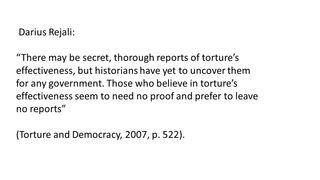Memory
Why Torture Doesn't Work
Torture to enhance interrogation is a demonstrable failure, given its own goals.
Posted March 26, 2016

Torture is pointless, useless and degrading for all involved – there are better ways to gather information from other human beings. Discussions and policy regarding prisoner and detainee interrogation need to be refocused as a behavioral and brain sciences problem, and not simply treated as a legal, ethical or philosophical problem. Getting the science, ethics and practice in line is a challenge, but it can be done. The contemporary behavioral and brain sciences should have a central operational and structural role in policing and intelligence agencies. I will explore these and related topics over the next few blog posts.
[part two; part 3; I elaborate the full case in my book, Why Torture Doesn't Work: The Neuroscience of Interrogation, published by Harvard University Press]
Does torture work?
The evidence is in, and it is very clear: Torture as an interrogational theory and practice is a complete and utter failure. This seems almost counter-intuitive: After all, we are bombarded with images and scenes from movies and television where torture is a great success at extracting information from the unwilling. Surely, the thinking goes, applying extremes of pain, torment, and stress to captives before (and during) interrogation will enhance their capacity and willingness to recall and reveal past events, as well as their current plans and future intentions? And, surely, the contents of their brain’s long-term memory systems will remain unaffected by the extreme stressors used during torture? The flooding of the brain by stress hormones will obviously have no effect on the structure and functioning of the brain itself. And we can surely assume with certainty that the conduction mechanisms coupling the brain’s memory and intention circuits to speech will be unaffected by torture.
Furthermore, the interrogators administering torture will be very well-trained, so much so that they will be especially sensitive to those they are interrogating, that they will be able to distinguish the innocent from the guilty, and they will only torture the guilty. More than this, they will also be able to detect lies, omissions, elisions and confabulations generated by the tortured while they impose carefully impose the extreme stressors used in torture. And, of course, leading information provided during questioning will not be incorporated into the memories and the answers provided by the tortured. We know, so the pro-torture argument goes, that the torturers will be able to precisely calibrate the degree of torment employed, ensuring minimal cruelty and suffering are employed to ensure that the detainee speaks freely and truthfully. Unnecessary, gratuitous and vengeance-driven escalation of torment will not occur. After all, the interrogational torturers will have been trained carefully in what they have to do, and will have substantial practice with unwilling human participants. They will possess a profound understanding of neurophysiological function: They will know how to bypass the pain gates of the thalamus and spinal cord, and they will be able to blunt the analgesic response that they body produces in response to pain, injury and suffering.
And when a murderous outrage occurs, and the perpetrators are captured, the standing squads of interrogational torturers trained, practiced, and maintained in democracies will be on call, ready to do their jobs. And, finally, when their day’s work is done, they will go home, enjoy a normal and carefree sleep, and delight in family and social life, utterly undisturbed by their day job. A day job which requires them to perpetrate continued physical and psychological assaults on the defenseless in order to gather reliable, veridical, actionable intelligence and information. After all, this is what we see in movies and television, time and again: The hero (or sometimes the anti-hero) forces someone to talk, the city is saved, and the torturer heads off at the end of the session, content in the knowledge of a difficult job well done.
What tortures are employed?
When put in these terms, the fatuousness of the pro-torture argument should become obvious. Even after setting ethical, moral and legal debates to one side, torture profoundly and negatively affects the tortured and, less obviously, the torturer. The range of ‘white tortures’ (assaults on our core psychological, neural, and physiological functioning) formerly deployed by the CIA and other agencies are by now well-known: oxygen deprivation through near-drowning and suffocation; shackling and stress positions; extended sleep deprivation; freezing, cooling, and starving the body and brain; overloading the senses with loud noise and bright lights; drip-feed assaults on personal dignity through facial slaps and holds, enforced nakedness, and the imposition of adult diapers; the slow destruction personhood through social isolation, social deprivation, and a deliberate program of deindividualisation; confinement in cramped boxes; predator threat using guns, drills, and attack dogs; pretended assaults on the loved ones of the captive. Somehow, the theory goes, this program of assault, when carefully calibrated and imposed, will cause the detainee to reveal the contents of their long-term memories, and to do so in a reliable, veridical and replicable fashion. It will not increase resistance, cause a hardening of the suspect, or increase the rate at which confabulation, misdirection, or false recall will occur: The signal-to-noise ratio of information acquired will be unaffected.
What do extreme stressors do to the brain?
There is overwhelming evidence (detailed in my new book, Why Torture Doesn’t Work: The Neuroscience of Interrogation) that the extreme stressors employed during torture force the brain away from the relatively narrow, adaptive range that it operates within. Furthermore, these stressors attack the fabric of the brain, causing tissue loss in brain regions concerned with memory (especially in the temporal lobes, adjacent the temples). Tissue growth is seen in brain regions especially concerned with the processing of fear and threat-related information. Hence the persistent and sustained states of hypervigilance and substantially lowered startle reflexes seen in post-traumatic stress disorder and related conditions. Finally, brain regions concerned with intention and general behavioral control become less responsive as a result of chronic and extreme stress (the prefrontal cortices). Multiple studies of combat and elite soldiers, certain patient groups, and normal populations demonstrate that these stressors substantially compromise memory, mood, and cognitive function.
To take some examples: Sleep deprivation is a most effective method for causing deficits in cognition, mood and memory, and it does so in direct proportion to the dose of sleep deprivation imposed. The sleep deprived show large decrements in psychomotor and general cognitive function, as well as profound deficits in declarative memory. Studies of persons in severe chronic pain, and studies of the interaction between supervening states of pain, cognition, and memory demonstrate reliably that pain impairs cognition, memory, and mood. Deliberate suffocation or near-drowning is a form of predator threat, involving the repeated imposition of a near-death experience. However, oxygen restriction reliably draws activity away from brain regions concerned with higher cognitive function and memory in favor of brainstem regions concerned with reflexive responses supporting immediate survival — militating against detailed recall.
Chronic and severe stress compromises integrated psychological functioning, impairing recall, and facilitating the incorporation of information contained in leading questions, and the captive and interrogator both might not know this subtle process of incorporation has occurred. Torture fails during interrogation because torture is an assault on our core integrated, social, psychological, and neural functioning. Given what we know of the brain, memory, mood and cognition, it is little surprise that the signal-to-noise ratio from torture is so poor.
Finally, we have a specialized brain network (the ‘pain matrix’) that automatically and reflexively responds to distress, pain and despair in another. Politicians framing torture policies do not personally waterboard, starve, or physically manhandle prisoners. They don't endure the filth of torture: the blood, detritus and effluvia from enforced nudity and prolonged stress positions (with the enforced wearing of adult diapers). But someone has to do this. And the results are in: Those who conduct torture on behalf of the state in democracies are terribly affected by what they have done, for reasons rooted deep in our brain circuitry.
Follow me on twitter: https://twitter.com/smomara1
For a detailed consideration of the empirical evidence on the above and related topics, see my book: http://www.amazon.com/Why-Torture-Doesnt-Work-Interrogation/dp/0674743903/ref=asap_bc?ie=UTF8 (published by Harvard University Press, Nov, 2015)
Reviews
An Irish Examiner Best Book of 2015
A Times Higher Education Book of the Week, 2015
Instead of simply providing utilitarian arguments, [O’Mara] argues that there is no evidence from psychology or neuroscience for many of the specious justifications of torture as an information-gathering tool. Providing an abundance of gruesome detail, O’Mara marshals vast, useful information about the effects of such practices on the brain and the body. (Lasana T. Harris Nature 2015-11-05)
Does torture actually work? To be sure, it can compel people to confess to crimes and to repudiate their religious and political beliefs. But there is a world of difference between compelling someone to speak and compelling them to tell the truth… Yet the assumption underlying the ticking time bomb defense is that abusive questioning reliably causes people to reveal truthful information that they would otherwise refuse to disclose. Few scholars have scrutinized this assumption―and none with the rigor, depth, and clarity of Shane O’Mara in his excellent book, Why Torture Doesn’t Work: The Neuroscience of Interrogation… Invoking the relevant science, he shows that torture undermines the very neurocognitive mechanisms requisite for recalling veridical information from memory. (Richard McNally Science 2015-10-16)
If the aim of the torturers is to extract information, they should read O’Mara’s book and adopt gentler methods. CIA and the rest of you, read and note. Neuroscience says your methods don’t work. (Steven Rose Times Higher Education 2015-11-26)



